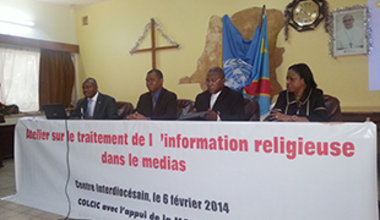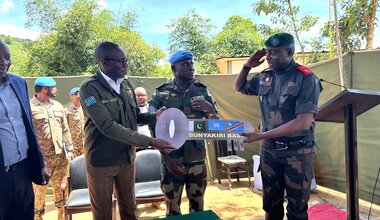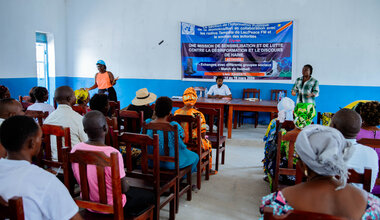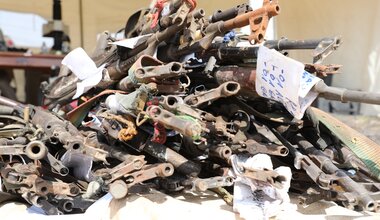Sensitization Campaign on Interfaith Dialogue

Kinshasa, 6 February 2014 – As part of its mandate to ensure the promotion of United Nations ideals, the United Nations Organization Stabilization Mission in the Democratic Republic of Congo (MONUSCO) has teamed up with the Christian and Islamic Laymen of Congo Committee (known by its French acronym COLCIC) to co-organize an awareness campaign for the promotion of peace. Launched in April 2013, the campaign ends during the first week of February, which was proclaimed the World Interfaith Harmony Week by the General Assembly in Resolution A/RES/65/5 of 20 October 2010. This year, the Week is celebrated from 3 to 9 February.
In that context, a workshop on “the treatment of religious information in the media” was held at the Interdiocesan Centre of Kinshasa on 6 February 2014. Academic pundits and media professionals led the workshop attended by some 50 journalists and talk show hosts, most of them working for religious media. The participants heard presentations on the basic principles for the treatment of information, on professional ethics and rules as well as the treatment of such sensitive information as religious information.
In parallel to this workshop during which the COLCIC presented an advocacy proposal for the establishment of a National Interfaith Dialogue, a series of broadcasts on the culture of peace and prevention of interfaith conflict risks were organized through some television and radio channels.
Focused on Interfaith Dialogue, this campaign sought to mobilize religious leaders, young university students, sociologists, historians, educators, communicators, civil society leaders, and UN agency members, and engage them in contributing their insights to the search for ways to achieve mutual understanding among the different faith groups and thus prevent the risks of confrontation or conflict outbreaks. In this period when the demons of division and violence have been unleashed at the country’s gates, this campaign encourages and supports the already existing tradition of interfaith dialogue in the DRC through encouraging social and civic commit among key religious leaders and involving leaders of laymen movements and associations in building awareness among grass-root communities.
In his remarks on the occasion of the celebration of the Day of Non-Violence in 2013, the United Nations Secretary-General stated: « I have made prevention a key priority in the five-year action agenda of the United Nations. But prevention means more than separating warring parties and cooling tensions. Fundamentally tackling the roots of conflict and intolerance will take a culture of non-violence and peace…We must work even harder for understanding among and within religions and communities and between and within countries.”
This understanding can only be nurtured through a continuous dialogue between different members of the same culture or members of different cultures and different religions. The Interfaith Dialogue, as a factor for the promotion of peace, is a phenomenon that implies the collaboration of the elites of these religions. This dialogue must be the bedrock on which can rest one’s respect for another’s belief, respect for differences, respect for ideas. This is what this project seeks to encourage, especially during this period when leaders of religious groups together have undertaken to lobby for peace.
Aïssatou Laba Toure/MONUSCO
 ONU
ONU Nations Unies Maintien de la paix
Nations Unies Maintien de la paix




